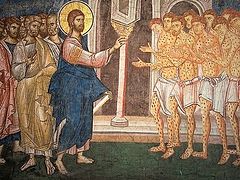An important aspect of prayer is thanksgiving. Both the Holy Scriptures and the Holy Tradition, not least the liturgical tradition, call us to constant thanksgiving. This is something we should learn now in this life, for we will give thanks perpetually in eternity. As the angels and saints proclaim in the Revelation: Blessing, and glory, and wisdom, and thanksgiving, and honor, and power, and might, be unto our God for ever and ever (Rev. 7:12).
The idea of being eternally and abundantly thankful seems unpleasant and ridiculous to non-believers; though sometimes they can’t formulate the reason clearly, this idea “creates problems” to them. The need to thank our neighbors here on earth often bothers us as well. Why?
Because in the fallen world humans often behave like a pack of monkeys, permanently trying to sort out who is higher in their informal hierarchy. And even gratitude is reduced to an element of these monkey-like games—thanking means recognizing that you are “a step lower”, a “receiver of favors”, and, therefore, dependent and weak. Benefaction often turns into a means of manipulation: “You are indebted to me to the grave”; so people are reluctant to acknowledge their moral obligation. This reveals itself especially when the level of trust between people is low and they think: “There must be a catch in these favors.”
At best gratitude is about observing etiquette, good manners—that is, a pleasant yet not obligatory part of life. “You can’t put ‘thanks’ in your pocket,” as the saying goes.
But in reality thanksgiving is the essence of life; it puts us into the “right relationship” with reality, namely the reality of God and that of other people.
The Creator and Master of the universe doesn’t seek to “dominate us”—it would be ridiculous to think so. On the contrary, He seeks to raise us up to Him. And thanksgiving opens our eyes to the reality of His love and care.
Years ago I watched a movie, the name of which I’ve since forgotten. It was about an acclaimed and famous elderly composer who lived in a splendid house. His daughter gave him every care and attention, but he was depressed, angry and displeased all the time. Coffee was always either “too hot” or “too cold”; the plaid on the arm-chair was always put “in the wrong way”; and the omelet was always “not cooked enough”… He was given the warmest and most affectionate love that can be imagined; yet he was a totally unhappy man because he couldn’t see this love at all: neither human love nor Divine.
God wants to make us happy and even happy beyond all measure in eternity. But it is impossible to make someone happy who cannot be grateful; that is not only unfair but simply impossible. We won’t be able to rejoice in Paradise until we have open, humble and grateful hearts, and the ability to see the love of God and people and recognize this love (“Thank you! I am grateful!”).
We must learn to see this love here and now. We Christians believe in providence—that is, that God reigns over His creation and directs all creatures to the aims they are destined for. The whole of this complex system, which includes galaxies and nebulae, gravitation and magnetism, the sun and rain, human beings and animals, is controlled by the Almighty in every detail. As the Lord Jesus says: Are not two sparrows sold for a farthing? and one of them shall not fall on the ground without your Father (Mt. 10:29). In truth no snowflake falls on the ground without Divine providence. This providence extends to all events in our lives, both major and minor.
There is a well-known phrase: “The bread that you ate this morning was made by God all night long.” In reality it took much longer, and this bread had passed through many hands and ended up on your table through the labor of many—God has provided this for you to have breakfast. This is not just a piece of bread and butter—this is a message of His love and care. On this porous rectangle is written: “I love you and take care of you.”
Gratitude accepts everything as a gift; all that we have, use, and rejoice in is a gift and manifestation of love. The taste of food, the light of the day, the scent of a flower, sounds of music—everything indicates His love, care and the great and ineffable joy that He is preparing for us.
In prayer we address God and say that indeed we believe and we are grateful.
All that we have has been received from God. He gives us the ability to work to get us involved in care for creation; sends us air, water and food; and our existence is the gift of His love. Thanksgiving appreciates all this—we are truly given every love and care and we give thanks for them.
However, our awareness that, “I don’t have anything of my own, everything is a gift from God”—exposes our distrust of God; we feel vulnerable. People find it terrifying to be totally dependent on someone’s mercy; people often deny mercy to each other. But we can rely on God; true, we have nothing except His love and mercy; it is the firmest, surest and most unquestionable thing in the whole universe. We give thanks to Him for our joy in prosperity and consolation in sorrows; but above all we thank Him for the gift of eternal life that He has prepared for us in Jesus Christ. As the Anaphora prayer of St. John Chrysostom reads: “Thou hast brought us from nothingness into being, and when we fell away Thou didst raise us up again, and Thou ceaseth not, until Thou hast done everything to bring us to Heaven, and grant us Thy Kingdom to come. For all these things we thank Thee, and Thine Only-begotten Son, and Thy Holy Spirit; for all the things we know and do not know; for the visible and invisible bounties, which have been bestowed upon us.”
We see how far Divine love has been extended to all of us—He “didst in the last days assume our flesh and wast crucified for us, ungrateful and ignorant as we were” (from the Prayers in Preparation for Holy Communion). He has granted us the Kingdom. We appreciate that and give praise to Him: Thanks be unto God for His unspeakable gift (2 Cor. 9:15).




